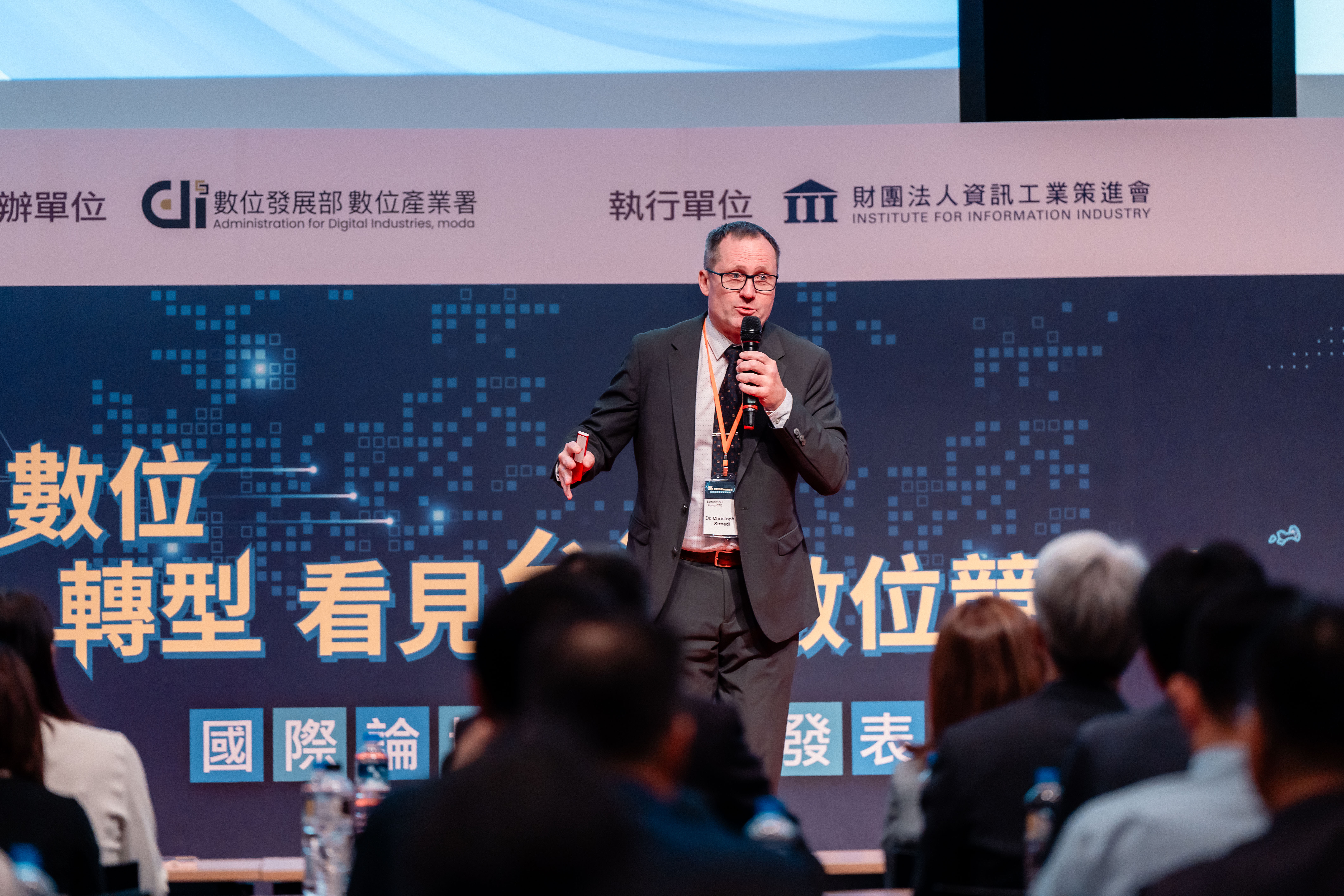
In this digital age of interconnectedness where data is considered an asset, and data-based services and decision making are key to remain competitive, businesses that aim to succeed should not rely solely on their own individual efforts. By establishing and participating in industry ecosystems, and by swiftly exchanging data and sharing resources and business functions with partners or government agencies, they can accelerate the launch of various products and services and speed up innovation. According to research by MIT Sloan School of Management Review, if a company's profit model is driven by an ecosystem, its profit margin can surpass that of its peers by 27%. Therefore, to help domestic information service providers align with international standards, the Ministry of Digital Affairs recently organized the "Digital Transformation International Fourm: Envisioning Taiwan's Digital Competitiveness". Dr. Christoph F. Strnadl, Deputy CTO at Software AG, a leading enterprise integration company, was invited to share his experience in building the European cloud and data infrastructure project – Gaia-X – during the event.
Dr. Christoph Strnadl stated that there are two key prerequisites for establishing an ecosystem: building trust and providing data and service integration mechanisms. After all, not all participants in an ecosystem are necessarily direct upstream or downstream suppliers of a company, but rather suppliers or partners who sell to the same group of customers. According to Strnadl, there are three modes for realizing an ecosystem. The first mode involves having a trusted platform provider where everyone is willing to upload/download data on the platform. This mode is the fastest and most cost-effective way to establish an ecosystem. However, ecosystems will not always be able to find such a trusted party in the middle every participant is willing to hand over its data. The second mode does not have this central platform but relies on creating a trusted and standardized data space. Each identity, authenticated as a member, can engage in peer-to-peer data exchange using certified (so called) data space connectors. Catena-X, the German-led international automotive supply chain data space with potentially 250,000 suppliers, is an example of this mode.
The third mode is the one adopted by the Gaia-X project. It involves the management of the ecosystem by one or more coordinators who implement and enforce core Gaia-X standards, possibly extended by ecosystem-specific rules. It is important to note that, in contrast to the second mode, the third mode allows for sharing not only data but also services. After applying for membership, participants can obtain permission to establish/join the ecosystem by installing relevant software components such as connectors or credential managers (protecting identities and ensuring trust), or by subscribing to services from suppliers. Data and service providers will enter their respective offerings into a suitable ecosystem catalog where potential consumers are easily able to find the required data assets or service functions.
Regardless of the type of ecosystem, whether it's a healthcare data space, financial data space, or mobility data space, members can participate in any role (provider and/or consumer) and are potentially able to access all data (and, if supported by ecosystem standards, services) available. Gaia-X, moreover, aims to facilitate the provision of federated cloud data infrastructures that ensures user data sovereignty, in addition to the platform services offered by major public cloud providers. This will facilitate cross-domain data sharing and interoperability in areas such as finance, healthcare, and society, promoting the development of the digital economy in Europe.
Taiwan's competitive edge in semiconductors, ICT, and precision health is fueled by industry consensus and supportive government regulations. In such a cooperative environment, ecosystems will further extend data and resource sharing allowing the realization of innovative technologies and services. This next level of collaboration accelerates progress, addresses complex challenges and attracts investments and talent. This industry-led approach, coupled with government support, fosters innovation, and solidifies Taiwan's global leadership position. Embracing ecosystems and facilitating data and service sharing unlocks Taiwan's full potential, driving economic growth in future-shaping industries.
Hashtag: #SoftwareAG #DigitalTransformation #API #Cloud #Infrastructure
https://www.linkedin.com/company/software-ag/
https://www.facebook.com/SoftwareAG
https://www.youtube.com/user/SOFTWAREAG
The issuer is solely responsible for the content of this announcement.
About Software AG
Software AG helps companies create effortlessly connected experiences for their customers, employees and partners. Its enterprise-grade iPaaS integrates anything, anywhere, any way users want by bringing application, data, B2B, API and event integration together in the same generative AI-enabled platform.
Trusted by the world's best brands for more than 50 years, Software AG enables end-to-end visibility and governance across geographies, IT environments, and complex business ecosystems, with hybrid multi-cloud connectivity, and enterprise-grade security relied on by banks, governments, and corporations around the world.
Software AG is majority owned by Silver Lake, the global technology investment firm. For more information, visit www.softwareag.com. And follow on LinkedIn and X (Twitter).



















